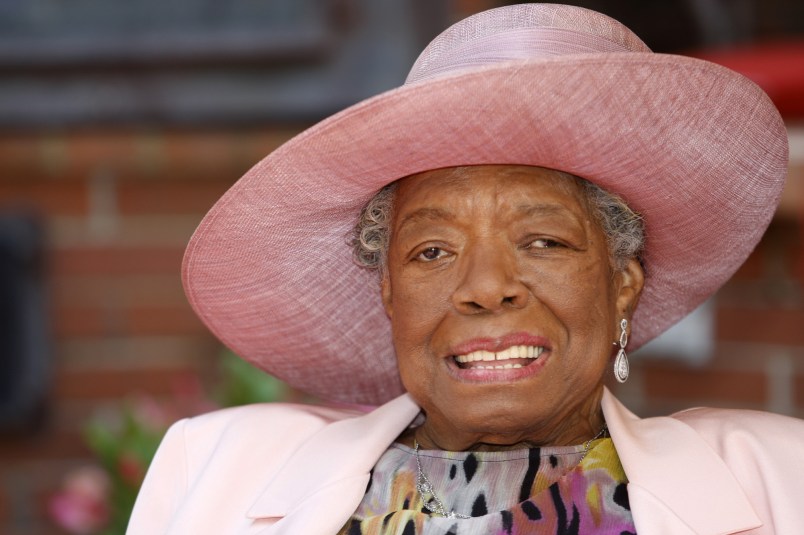You can pick up any of Maya Angelou’s seven autobiographies or any of her poetry and find the story of her life. Born in 1928 in St. Louis, Missouri then raised Stamps, Arkansas, she entered adulthood in various parts of California. She suffered through the trauma of racism, poverty, sexual assault, and other personal horrors to become one of America’s most well-respected authors and speakers. Maya Angelou’s death, announced on Wednesday and which came at the age of 86, leaves a tear in the fabric of American literature. Later in life, she became an easy target for parody, but her legacy of carving out a path of identity through defiance and confidence is undeniable.
In 1969, when she was 40, Angelou’s first autobiography, I Know Why the Caged Bird Sings was published. Frequently banned because of its honest and gripping re-telling of childhood sexual abuse, racism, and questions about sexuality, it knocked open doors and gave other African-American women writers permission to tell their stories without fear or shame. At the time of its publication, The Black Arts Movement of the time pushed the idea that all Black art had to be functional in the fight for civil rights. Black art was supposed to be crafted around the entire race as a whole. I Know Why the Caged Bird Sings may have been styled after slave narratives, but it was unique in its storytelling because Angelou wasn’t trying to uplift all Black people. She didn’t write for a white audience in order to gain its empathy. I Know Why… was centered on one Black girl’s coming of age story. Angelou broke boundaries by defiantly lifting her head and identifying herself as an individual and not as savior to anyone other than herself.
Angelou’s poetry, particularly her third collection called Still I Rise, elevated her further. Her poems “Phenomenal Woman” and “Still I Rise” have become tradition at talent shows across Black America, but they exude a confidence that shows up in the arrogance of Kanye West and Nicki Minaj. At six feet tall with wide eyes, a wide nose, a gap between her teeth, large feet, a deep voice, and short hair, Angelou was not a “traditional beauty.” She learned to push back against what she was not and built up all that she was. She understood that the confidence she held was a mystery to those who might have been prettier, wealthier, and/or not African American. The love she had for herself astounded, and in poems like “Phenomenal Woman” and “Still I Rise,” other African American women found again permission to accept and love themselves. As novelist Tayari Jones tweeted following the announcement of Maya Angelou’s death, Angelou refused to be a tragic figure.
Maya Angelou is more than her most popular work like I Know Why the Caged Bird Sings, “Phenomenal Woman,” “Still I Rise,” her inauguration poem for former President Bill Clinton, or even her famous relationship with Oprah Winfrey. It’s perhaps her friendship with Oprah that leaves the country with an image of her as grey-haired sagacity. However, before Angelou could get to a point where she soothed national audiences with poetic wisdom, she dealt with the horrors of racism, poverty, and sexual assault in order to find her strength and self-esteem. As a child, Dr. Maya Angelou suffered through the trauma of molestation via silence. What a joy it must have been to have her later years filled with audiences who hung on her every word.
Nichole Perkins is a freelance writer, based in her hometown of Nashville, Tennessee.







A great poet. A fine life.
“for life is not a paragraph
and death I think is no parenthesis”
Her LEGEND can be contained by neither. Words fail where angels tread.
I never knew she owned a gun and she wasn’t afraid to use it.
Truly an amazing lady. I wish all liberals shared her steadfast refusal to let circumstances turn her into a victim.
Vaya con Dios, Maya!